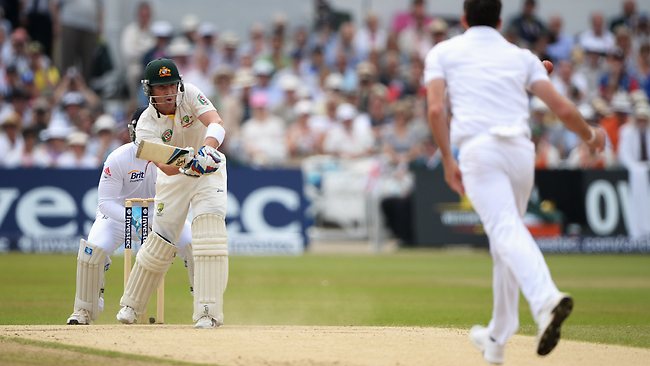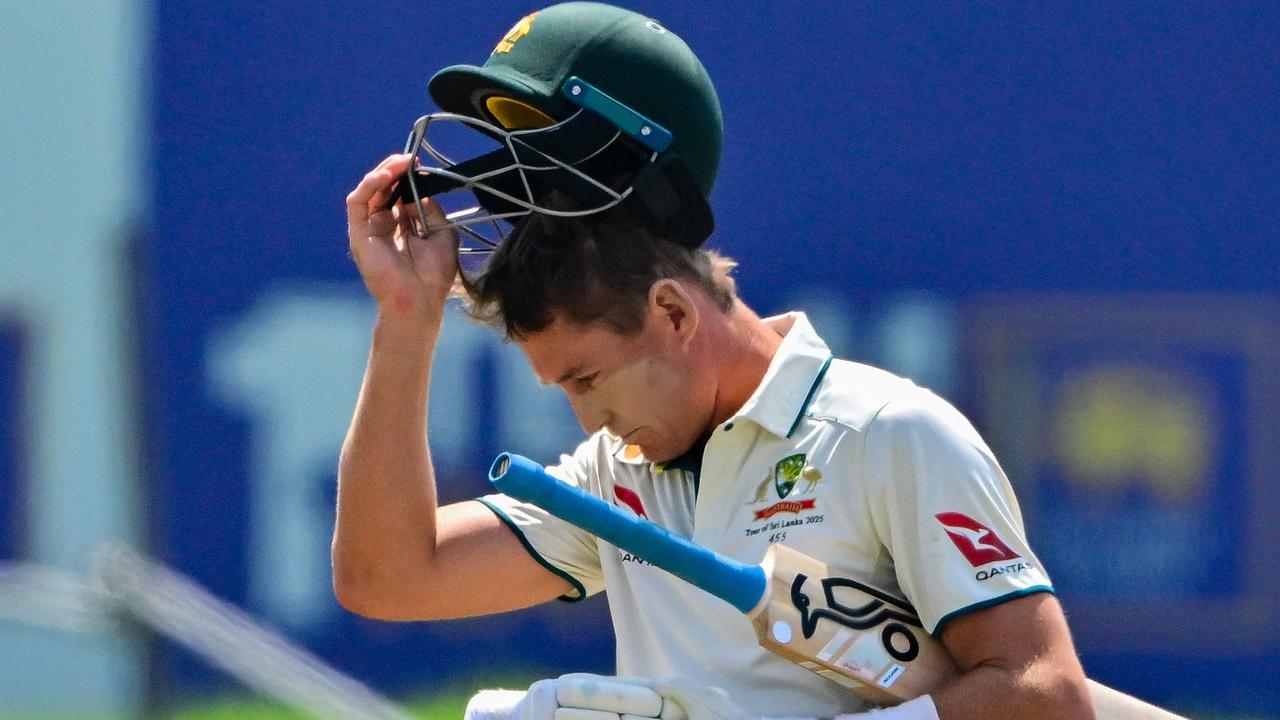Australia's Ashes heartbreak - Brad Haddin's heroics fall short
THE opening Test of the 2013 Ashes has ended on an appropriate note of DRS controversy after a not-out ruling against Brad Haddin was overturned.
THE opening Test of the 2013 Ashes series has ended on an appropriate note of DRS controversy after a not-out ruling against Brad Haddin 15 runs short of victory was overturned on referral.
This should be a Test recalled for the batting heroics of teenage Australian debutant Ashton Agar and the inspired10-wicket swing bowling of England pace spearhead James Anderson but instead it will be remembered mainly for all the angst caused by the Decision Review System.
Australia’s battling rear-guard action to score the 137 runs needed on the final day to win this Test appeared to when Peter Siddle became the ninth wicket to fall in the innings, and the third of the morning to James Pattinson, with the score at 231, still 80 runs short.
But some swashbuckling batting from Haddin and the left-handed Pattinson, aided, it must be said, by some immature bowling by England paceman Steven Finn, saw Australia, for the second time in this match, stage a remarkable last-wicket stand.
The end goal of 311 runs was tantalisingly in sight when Australia reached 296 after a rollicking partnership of 65 off 99 balls by Haddin and Pattinson when the Australian vice-captain attempted a forcing shot through point off Anderson. The England slips cordon went up in what initially seemed a half-hearted appeal for caught behind by Matt Prior and the first reaction of umpire Aleem Dar was to shake his head.
But where Australia had no more referrals left after wasting them on day four in vain attempts to save the wickets of Shane Watson and Michael Clarke, England had two and now was as good a time as any for captain Alastair Cook to use the first of them.
The third umpire, South African Marasi Erasmus, quickly found an incriminating Hot Spot on Haddin’s bat but double-checked on the audio before sending down the word to Dar to overturn his decision and give him out for 71 AS England went 1-0 up in the five-Test series.
Australian heads around the ground hung in despair as painful memories of the Allan Border-Jeff Thomson last wicket stand ending just three runs short of victory at the MCG in 1982 bubbled to the surface, along with the more recent one of Edgbaston 2005 when England won by two runs after Michael Kasprowics was ruled to have been caught off the glove – even though his hand was off the bat.
Many had questioned the wisdom of the selectors for their seemingly retro choice of Haddin to be Australia’s first-choice keeper and deputy to Michael Clarke, but the 35-year-old veteran showed precisely today why he is valued so highly.
As the pressure built and built, he remained utterly unflustered, giving only the one chance when, on 64, he swept Graeme Swann to deep backward square where Finn, having a miserable match that could well end his England career, dived full length to get two hands to the ball.only for it to spill out.
The huge roar that had echoed around the ground when it was thought he had taken the catch turned to a despairing groan when it was realised that not only had he dropped the ball but he then also allowed it to scuttle over the boundary for four.
England effectively used only two men in its attempt to clean up the Australian tail this morning, Anderson the bowler, Alastair Cook the catcher.
The two combined to claim the first three wickets to fall, with Ashton Agar, Mitchell Starc and Peter Siddle all edging the England strike bowler to slip where Captain Cook gratefully accepted the catch.
Indeed, four times the ball flew to Cook but on one occasion, when Siddle was on 10, he showed he was human y failing to grasp it. Siddle scampered a single but it was to be his last run, with the England captain making good his mistake the very next over from Anderson.
Australia began the day at 6-174, needing an improbable 137 runs for victory, with Haddin 11 and Agar 1, with Cook predictably entrusting the task of making the early inroads to his two most trusted bowlers, Anderson and Graeme Swann.
Haddin, after painstakingly shepherding Agar through the testing opening 30 minutes, with conditions so dim and overcast that the floodlights had to be employed, began to chance his arm whenever off-spinner Graeme Swann pitched up.
A First Test specialist in Ashes combat – having scored 121 at Sophia Gardens in the opening Test of the 2009 series and 136 at the Gabba in the corresponding Test of the 2010-11 series – Haddin once again rose to the challenge of trying to get Australia off to a 1-0 start.
A slog sweep to the boundary off Swann to move to 20 signalled the start of his offensive and soon not even Anderson was safe as the Australian vice-captain imperiously lifted him over to top of cover to the fence.
Sensing the change in mood, Agar too grew in confidence, opening the face of his bat and steeping Anderson down to the third man fence as Anderson, encouraged by the teenager’s teasingly high backlift, attempted to slip a yorker through his defence. Stuart Broad, too, came in for the treatment, as Agar rocked onto the back foot to crach him through point for four to go to 14.
That sadly, was to be the young left-hander’s final contribution in one of the most memorable Test debuts of all time. Anderson, coming around the wicket, angled one in at him but got it to move away off the pitch and it was a sign of just how well Agar was batting that he actually was able to get an edge on the magnificent delivery, with Cook doing the rest.
Mitchell Starc, his batting credentials inflated by his 99 against India in Chandigarh in March, survived only five deliveries for a single, never looking comfortable, before he too joined the “c Cook b Anderson” club. At that point Anderson had claimed 2-0 off four deliveries.
Peter Siddle, too, brought impressive batting figures from India with him to the wicket, having scored 51 and 50 in Australia’s previous Test, in Delhi, and, save for the false stroke that Cook grassed, he looked very much a solid batsman as he applied himself for 11 valuable runs before becoming the third club member.
It wasn’t so much the arrival of the No.11 batsman James Pattinson that prompted Haddin to go onto an all-out offensive as the introduction of Finn to the attack after Anderson had bowled 13 overs unchanged from the Radcliffe Road end for an heroic 3-29.
Suddenly, after having been shackled and constrained by Anderson’s impeccable line and length, Haddin broke loose, smashing three consecutive fours from Finn’s opening over, the first of which brought up the Australian 250, the second, a stand-and-deliver on-drive, registering his personal half-century.
By the time Finn had finished his over, Cook had no fewer than five men stationed on the fence, but astonishingly the England captain decided to make a show of faith in the lanky paceman and gave him a second over. It went for nine runs, including a wildly wayward delivery down the legside that not even the acrobatic Prior could pull in.
Every run by this stage was vital, even the overthrow from point fieldsman Jonny Bairstow that would have run out Haddin on 60 had it struck. But it missed and the Australians gratefully banked the bonus run.
Man of the match Anderson said: "It has been a draining five days emotionally and physically, very tight game, we are delighted to come out with a win.
"I am just delighted we could sneak home. It was incredible tension, I am lost for words, really. It has been an amazing five days. The Australian tail is quite extraordinary _ they are very difficult to get out."
Despite the second Test starting in just four days, Clarke says his young team can continue to show courage and bounce back and win the Ashes.
“I don't think it will be that difficult, to be honest,” said Clarke, who refused to blame umpiring decisions for the loss.
“We feel we were so close to winning this Test, but I can guarantee they'll be counting down the next four days to start the second Test.
“The guys are full of energy and we want to have success on this tour.
“We will play our best cricket and earn the respect of the people who don't respect us.”
Clarke had no complaints about the role the DRS played in deciding the Test.
"Times have changed, haven't they? The system is consistent for both teams,'' he said.
Clarke also paid tribute to Haddin, whose innings took Australia so close to victory.
“I think the courage he showed to play his natural game, the way he played under pressure ... it was a credit to him. I think again experience plays a big part there,” Clarke said.
“He deserves a lot of credit for fighting so hard and there is probably no one in the changeroom now more disappointed than Brad.”



